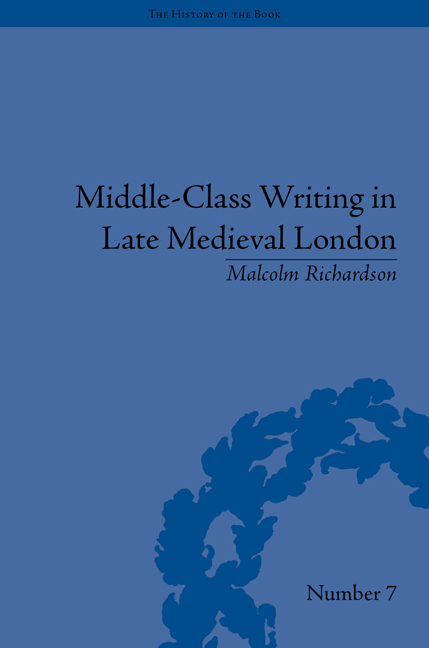Book contents
- Frontmatter
- CONTENTS
- Acknowledgements
- List of Abbreviations
- List of Tables
- Introduction: Pirates and Pens
- 1 London Middle-Class Writing: The Institutional Bases
- 2 ‘An Inextricable Labyrinth’: The Major Genres of Civic Life
- 3 English Middle-Class Writing in the Earlier Fifteenth Century: The Vernacular Letters
- 4 Women's Letters and Men's Books
- Conclusions and Speculations
- Notes
- Works Cited
- Index
Introduction: Pirates and Pens
- Frontmatter
- CONTENTS
- Acknowledgements
- List of Abbreviations
- List of Tables
- Introduction: Pirates and Pens
- 1 London Middle-Class Writing: The Institutional Bases
- 2 ‘An Inextricable Labyrinth’: The Major Genres of Civic Life
- 3 English Middle-Class Writing in the Earlier Fifteenth Century: The Vernacular Letters
- 4 Women's Letters and Men's Books
- Conclusions and Speculations
- Notes
- Works Cited
- Index
Summary
If a historian wished to list reasons for the growth of writing skills in England at the end of the middle Ages, piracy would likely not be rated very highly. But consider: when two galleys laden with mercantile goods sailed from Zeeland towards London in early May of 1478, they were waylaid in the English Channel by privateers allied with the Hanse. Although unwelcome, the attack would have come as no surprise. The Libelle of Englyshe Polyce, a clunky but fascinating poem from a few years earlier, complains testily about Bretons and other coastal riff-raff:
… of thys Bretyns, who so trewth leveth,
Are the gretteste rovers and the gretteste thevys
That have bene in the see many a yere;
And that oure merchautes have bowght alle to dere. (ll.158–61)
Understanding his situation only too well, the highly practical captain of one merchant vessel quickly lightened the ship by tossing much of his merchandise overboard and, like Brave Sir Robin, ‘bravely ran away’. The second captain, skippering a Florentine vessel bearing the flags and insignia of the duke of Burgundy, allowed his ship to be captured fully laden and then be escorted back to Burgundian territory. His colleague, anchoring at Southampton while leaving its remaining cargo on board, quickly notified the London home office about his adventure and about arriving in the harbour of a ‘foreign’ port.
- Type
- Chapter
- Information
- Middle-Class Writing in Late Medieval London , pp. 1 - 20Publisher: Pickering & ChattoFirst published in: 2014



